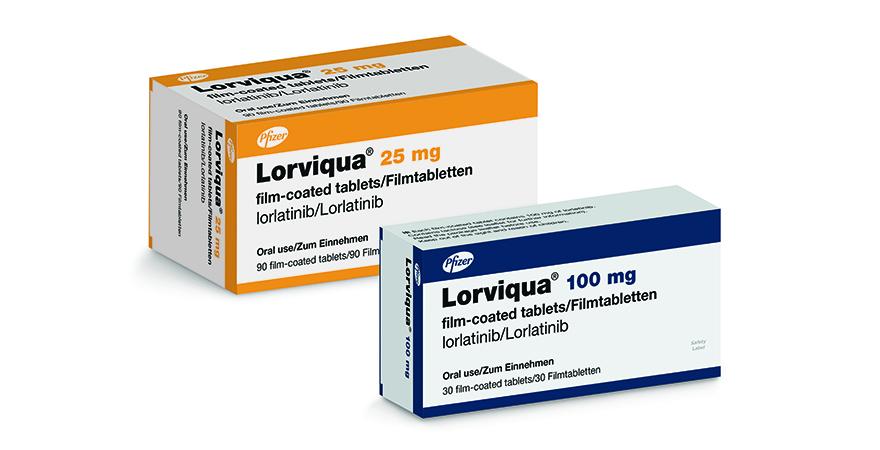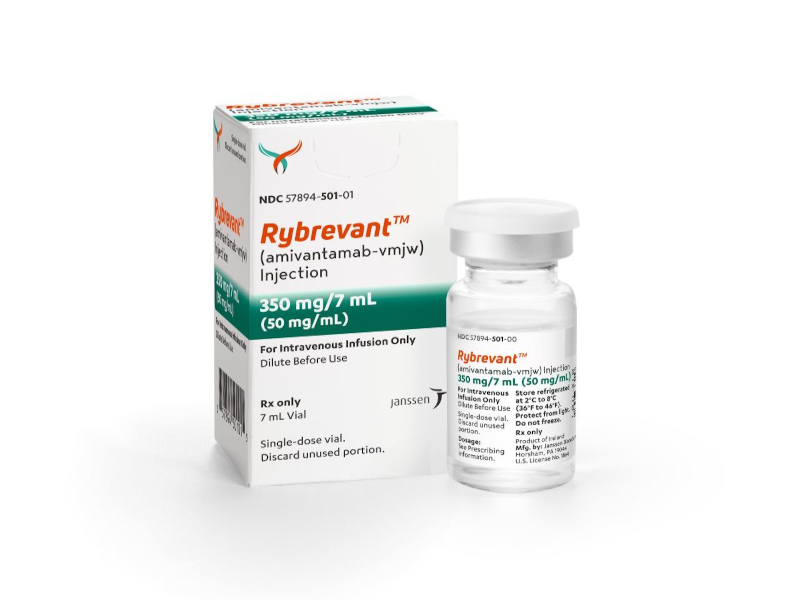Lorviqua (lorlatinib) vs Rybrevant (amivantamab-vmjw)
Lorviqua (lorlatinib) vs Rybrevant (amivantamab-vmjw)
Lorviqua (lorlatinib) is a third-generation anaplastic lymphoma kinase (ALK) inhibitor used to treat patients with ALK-positive metastatic non-small cell lung cancer (NSCLC) who have progressed on prior ALK inhibitors. Rybrevant (amivantamab-vmjw) is a bispecific antibody targeting both epidermal growth factor receptor (EGFR) and MET receptors, indicated for the treatment of adult patients with NSCLC with EGFR exon 20 insertion mutations whose disease has progressed on or after platinum-based chemotherapy. The choice between Lorviqua and Rybrevant would depend on the specific genetic mutations present in a patient's cancer, their previous treatments, and their overall health profile, which should be evaluated by a healthcare professional to determine the most appropriate therapy.
Difference between Lorviqua and Rybrevant
| Metric | Lorviqua (lorlatinib) | Rybrevant (amivantamab-vmjw) |
|---|---|---|
| Generic name | lorlatinib | amivantamab-vmjw |
| Indications | Treatment of patients with anaplastic lymphoma kinase (ALK)-positive metastatic non-small cell lung cancer (NSCLC) | Treatment of adult patients with locally advanced or metastatic non-small cell lung cancer (NSCLC) with epidermal growth factor receptor (EGFR) exon 20 insertion mutations |
| Mechanism of action | ALK and ROS1 tyrosine kinase inhibitor | Bispecific antibody that targets EGFR and MET receptor tyrosine kinases |
| Brand names | Lorviqua | Rybrevant |
| Administrative route | Oral | Intravenous |
| Side effects | Hypercholesterolemia, hypertriglyceridemia, edema, weight gain, peripheral neuropathy, cognitive effects, fatigue, etc. | Infusion-related reactions, rash, paronychia, musculoskeletal pain, dyspnea, nausea, etc. |
| Contraindications | None known | None known |
| Drug class | Tyrosine kinase inhibitor | Monoclonal antibody |
| Manufacturer | Pfizer | Janssen Biotech, Inc. |
Efficacy
Lorviqua (lorlatinib) for Lung Cancer
Lorviqua, known by its generic name lorlatinib, is a targeted therapy approved for the treatment of patients with anaplastic lymphoma kinase (ALK)-positive metastatic non-small cell lung cancer (NSCLC) who have progressed on crizotinib and at least one other ALK inhibitor for metastatic disease or whose disease has progressed on alectinib or ceritinib as the first ALK inhibitor therapy for metastatic disease. Lorlatinib is a third-generation ALK tyrosine kinase inhibitor (TKI) designed to inhibit the most common tumor mutations that drive resistance to earlier ALK inhibitors. Clinical trials have demonstrated lorlatinib's efficacy in patients with ALK-positive NSCLC, showing substantial intracranial activity and durable responses, which are critical for patients with central nervous system involvement.
Rybrevant (amivantamab-vmjw) for Lung Cancer
Rybrevant, with the generic name amivantamab-vmjw, is a bispecific antibody approved for the treatment of adult patients with NSCLC with epidermal growth factor receptor (EGFR) exon 20 insertion mutations, whose disease has progressed on or after platinum-based chemotherapy. This approval was based on the results of the clinical trial that demonstrated the efficacy of Rybrevant in this patient population. Patients treated with Rybrevant showed a significant response rate, with a portion of these responses being durable. The therapy represents an important treatment option for patients with this specific and difficult-to-treat form of lung cancer.
Comparative Efficacy in Lung Cancer
Both Lorviqua and Rybrevant are examples of precision medicine, targeting specific genetic alterations in lung cancer cells. Lorviqua's efficacy is specific to ALK-positive NSCLC, where it has shown to be effective even after the failure of previous ALK inhibitors. On the other hand, Rybrevant targets NSCLC with EGFR exon 20 insertion mutations, offering a new treatment avenue for patients with these specific genetic alterations. The efficacy of each medication is highly dependent on the presence of their respective genetic targets within the tumor cells, highlighting the importance of genetic testing in the management of NSCLC.
Conclusion
In conclusion, Lorviqua and Rybrevant have each shown efficacy in treating specific subtypes of lung cancer characterized by particular genetic mutations. Their approval has provided new hope for patients with these advanced forms of lung cancer, offering targeted treatments that can lead to significant clinical responses. As precision medicine continues to evolve, the efficacy of these drugs underscores the potential for more personalized and effective treatment strategies in lung cancer.
Regulatory Agency Approvals
Lorviqua
-
European Medical Agency (EMA), European Union

-
Food and Drug Administration (FDA), USA

-
Health Canada

-
Therapeutic Goods Administration (TGA), Australia

Rybrevant
-
European Medical Agency (EMA), European Union

-
Food and Drug Administration (FDA), USA

Access Lorviqua or Rybrevant today
If Lorviqua or Rybrevant are not approved or available in your country (e.g. due to supply issues), you can access them via Everyone.org.
How it works

Make an enquiry
Choose the medicine you want to buy, answer a couple of questions, and upload your prescription to speed things up. We’ll get back to you within 24 hours.


Make an enquiry
Choose the medicine you want to buy, answer a couple of questions, and upload your prescription to speed things up. We’ll get back to you within 24 hours.


Breeze through the paperwork
We'll guide you through the required documents for importing unapproved medicine, ensuring you have all the necessary information.


Get a personalized quote
We’ll prepare a quote for you, including medicine costs and any shipping, administrative, or import fees that may apply.


Receive your medicine
Accept the quote and we’ll handle the rest - sourcing and safely delivering your medicine.

Some text on this page has been automatically generated. Speak to your physician before you start a new treatment or medication.
Let's talk
If you have any questions, call us or send us a message through WhatsApp or email:
Contact us




